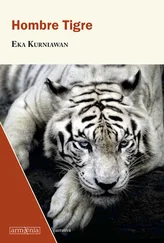Those two Dutch tourists had gotten a pretty good hotel on the bay. The wife whispered to her husband, “We made love here once and Papa caught us, and that was the last time we saw him.” Her husband nodded. They walked toward the receptionist’s desk and were greeted by a young man in a white uniform with such a perfectly symmetrical bow tie that he looked stiff and unnatural, smiling and thrusting forward the guest book. The man wrote their names there, in elegant old-fashioned cursive: Henri and Aneu Stammler.
That whole day they rested in their hotel room, which Aneu Stammler remarked had changed a lot since the colonial era: “I’m even willing to bet the present owner is a native.” They were planning a small excursion for the following day but they didn’t seem at all hurried, as if they planned to stay in the city for quite some time, maybe months or maybe years. Many Dutch tourists did that kind of thing, getting all nostalgic for the past when they had lived here, before being driven out by war.
A bellhop came, bringing them room service as well as the message, “While you are here, Sir and Madam, please do be careful of the communist ghosts.”
“Karl Marx already warned us about that in the first paragraph of his Manifesto ,” said Henri Stammler laughing, and then they ate a dinner that brought back all the tropical tastes they had practically forgotten.
But before they ate, and before the bellhop left, Henri asked:
“Do you know a woman named Dewi Ayu? She’s maybe about fifty-two years old.”
“Of course,” said the kid, “there’s not a single person in Halimunda who doesn’t know her.”
Henri Stammler and his wife jumped with a feeling of untold delight. They had flown almost halfway across the world just to get to this city and find their daughter, whom they had left on her grandfather’s doorstep. They both looked at the kid with a dumbfounded stare, as if they didn’t believe that they could find her so easily.
“Is she half white?”
“Yeah, there’s no other Dewi Ayu in this city.”
“So she is still alive?” asked Aneu Stammler with her eyes welling up.
“No, Madam,” said the kid. “She died not too long ago.”
“Why did she die?”
“Because she wanted to.” The kid prepared to take his leave, but before vanishing through the doorway he added, “But there are lots of other whores, if you’re still looking for one.”
So now they knew that Dewi Ayu had lived as a prostitute. The kid said that Dewi Ayu was a local legend, the most highly praised whore in the city, although that didn’t impress Henri or Aneu Stammler that much. “All of the men wanted to sleep with her. Even two of her three son-in-laws took her to bed. She was an incredible whore.”
“So she has three daughters?” asked Aneu Stammler.
“Four. The youngest was born twelve days before Dewi Ayu died.”
The kid told them the address where they could find their youngest granddaughter, that she lived with and was taken care of by a mute servant named Rosinah, and that Dewi Ayu had named her Beauty.
“But she is hideous, like a monster,” warned the kid.
They found out for themselves when they visited the house the next day. They both almost fainted, incredulous that they had a granddaughter like that. “Like a burnt cake,” said Aneu Stammler, sinking down into a chair.
Rosinah lay the baby Beauty down in a cloth cradle-swing that was hung in the doorway, and gave the guests two glasses of cold lemonade. “Dewi Ayu was bored of having pretty children, so she asked for an ugly one, and this was the result,” she said in sign language.
Henri and Aneu Stammler didn’t understand her at all, and nothing made Rosinah crankier than having to communicate with people who didn’t understand her sign language. But she was a kind woman, so she went and got a notebook, and wrote down what she had just said to them.
“What about her other children?” asked Henri.
“They have never set foot back here, ever since they discovered men’s dicks,” wrote Rosinah, repeating what Dewi Ayu had once said to her.
The couple took a little tour around the house, looking at the photographs hanging on the wall. There was a photo of Ted and Marietje Stammler that made them burst into tears, which in turn made Rosinah shake her head at these maudlin old folks. And after crying, now they were laughing to see a photo of themselves when they were still teenagers hanging in the front room. “I am willing to bet they’ve just been released from a mental hospital,” Rosinah signed to the baby in her swing. Henri and Aneu Stammler were fascinated to see the photos of Dewi Ayu. There was one from when she was still small, and one when she was a teen. There were none from her twenties because of the war, but there were more pictures of her once she had grown up, even one from when she was already about fifty years old. They were struck by the fact that at any age, their daughter displayed an equally captivating beauty. It wasn’t that surprising that she had been a prostitute, the idol of many men.
There were photographs of other beautiful young women too. “The one with the white face and tiny eyes like a Japanese is named Alamanda,” Rosinah explained, playing her role as a tour guide. “She’s married to Shodancho, a soldier, and has a child named Nurul Aini. The girl who looks most like Dewi Ayu is Adinda, her second daughter,” Rosinah wrote in the notebook. “She is married to a communist veteran named Comrade Kliwon and has a son named Krisan. The third daughter, who looks more Indo than native, the most beautiful of all, is Maya Dewi. When she was twelve she married the most hated criminal in this city, Maman Gendeng, and now, after five years as a virgin bride, she finally has a daughter, Rengganis the Beautiful.” Rosinah had never met any of the three children, but Dewi Ayu had told her all this.
Suddenly an incredible force hit them, as if the air had suddenly been sucked out of the room, or had congealed on their skin, and the hair on the back of their necks stood up.
“Oh my God,” said Henri. “What sort of evil power is this?”
“I don’t know, but this house is haunted. It’s not a terribly evil ghost, but it is definitely holding a grudge.”
“Is it a communist ghost?” asked Aneu Stammler, cowering against her husband.
“Those ghosts are out in the streets, not in this house.”
The photographs on the wall began to sway slightly as if blown by a breeze. The book in Rosinah’s hand opened and closed. Little Beauty’s swing rocked back and forth gently. Then there was the sound of a plate breaking in the kitchen and a pan went rattling across the floor.
“Is it Dewi Ayu’s ghost?” asked Aneu.
“I’m not sure,” wrote Rosinah. “Dewi Ayu once said that the ghost of Ma Gedik followed her wherever she went, and she was afraid of him, but so far he hasn’t done anything to hurt us.”
“Who is Ma Gedik?” asked Henri.
“Dewi Ayu said he was her ex-husband.”
Once that supernatural disturbance had come to an end and the photographs were once again hanging stiff and straight on their nails Henri Stammler said, “This city has too many ghosts.” Then he gulped down his cold lemonade, trying to calm himself down. “I don’t see any pictures of a man who might be Ma Gedik.”
“I have never seen him either,” replied Rosinah.
Before Beauty was born, the two of them, Rosinah and Dewi Ayu, would often sit on a small bench in front of the kitchen hearth telling each other stories. Once, Dewi Ayu had told her the story of Ma Gedik. She had married him, forcing him to become her husband, because she loved him so much. She had never loved another man as much as she loved that old guy. “Even though it was clear that my love was completely unrequited. In fact, he thought I was an evil witch,” Dewi Ayu had said, laughing. She had loved him before she’d ever seen him, because her mother’s mother had loved him so much. “That poor pair of sweethearts, Ma Gedik and my grandmother Ma Iyang. Their love was destroyed, just as their lives were destroyed, because of the unbridled greed and lust of a Dutchman,” Dewi Ayu had said. “And what’s even more tragic is that the greedy and lustful Dutchman was my own grandfather.” Dewi Ayu had loved Ma Gedik ever since she’d heard that tale. Maybe the houseboys or the neighbors had told her. She’d claimed that she’d kill herself if she couldn’t marry that man, and so she’d had him kidnapped, and then she married him against his will, though in truth they’d never consummated their union. “He ran to the top of a hill and threw himself off.” And ever since then, his ghost had followed her wherever she went.
Читать дальше











